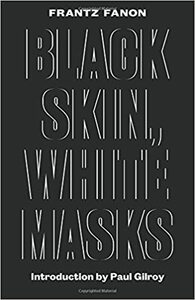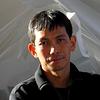Take a photo of a barcode or cover
Stopped at page 72. This is one of those books I just acquired somehow and tried to read because I'm working through the books on my physical shelves. The language is very academic and the content is very dated. It also seems to be more specifically about racial identity in France and the French Antilles. I think it's important to read about race, but I'd rather spend my time on a more contemporary, relevant text.
emotional
informative
reflective
medium-paced
challenging
emotional
hopeful
informative
reflective
tense
“In the world I am heading for, I am endlessly creating myself.
I show solidarity with humanity provided I can go one step further.”
#bookfeature 📖 Black Skin, White Masks by Frantz Fanon. This is an intriguing book that uncovers the detrimental effects of colonization, professing witness accounts of behaviours of the colonized subjects. Fanon offers a compelling argument on the psychological impacts that the colonized subjects suffer from, even till present day. Written in the context of France in the 1940s, it was first published in 1952 - hailed for its scientific analysis.
💭 “Understanding something new requires us to be inclined, to be prepared, and demands a new state of mind.”
I picked up this book after attending a talk by NUS prof, Dr Suriani, who unpacked and discussed the internalisation of a sense of inferiority in Malays. Upon reflection, I drew parallels to minority voices and lived experiences here in Singapore, always struggling and dealing in a conflicting reality. One where we continue to define and redefine our individuality and identity, in a majority Chinese society. I could relate to the valid points made about how the idea of “Malayness” could be easily misconstrued with negative, backward traits, thus justifying the need for Malays to be more like the Chinese (who are deemed to be superior and more successful). I know of Malay friends who proudly claim they do not want to date Malays. I know of Malay friends who refuse to speak Malay simply because. And I know of my own underlying biases that used to surface from time to time. This led me to realise the power of internalised racism, and how minorities do fall prey to it - compelling us to feel the need to acquire “appropriate” behaviours of a majority race - i.e. preferring to be like the Chinese.
Reading this book urged me to reflect and realise that leaders and role models are still largely Chinese male men - with a few minority representatives that we do celebrate and revere. The optics of race and race relations here in Singapore society remain prevalent in any discourse on societal issues.
While a few seem to argue and stand proud of our meritocratic system, an increasing number of us are realising the disparities and inequalities that seem to persist, if not grow.
I recall discussing with my students on microaggressions and the harmful effects we leave on others when we discriminate based on skin colour and race. When we make jokes that jab at another’s self-esteem. And when we choose not to see race, dismissing the lived realities of minority groups everywhere. I recall dealing with difficult views of individuals who continue to believe that there is an inherent inferiority in the minority races, and I remember reminding myself never to generalise based on baseless assumptions. Biases and prejudices are difficult to unlearn - we must do the work. A collective defensive othering is not the way to go.
This book remains a powerful force today on revolutionary struggle and racial difference in human history. With white supremacy and anti-blackness being witnessed all over the world today - including in Singapore - we cannot help but realise that the work for true justice and equality (as we pledge daily) is an ongoing process. We cannot misrecognize failures of individuals and end up collectivising it to the whole race.
This is a book I’d highly recommend with critical accompanying reads: ‘The Myth of the Lazy Native’ by Syed Hussein Alatas ‘The Singapore Dilemma’ by Lily Zubaidah Rahim
I show solidarity with humanity provided I can go one step further.”
#bookfeature 📖 Black Skin, White Masks by Frantz Fanon. This is an intriguing book that uncovers the detrimental effects of colonization, professing witness accounts of behaviours of the colonized subjects. Fanon offers a compelling argument on the psychological impacts that the colonized subjects suffer from, even till present day. Written in the context of France in the 1940s, it was first published in 1952 - hailed for its scientific analysis.
💭 “Understanding something new requires us to be inclined, to be prepared, and demands a new state of mind.”
I picked up this book after attending a talk by NUS prof, Dr Suriani, who unpacked and discussed the internalisation of a sense of inferiority in Malays. Upon reflection, I drew parallels to minority voices and lived experiences here in Singapore, always struggling and dealing in a conflicting reality. One where we continue to define and redefine our individuality and identity, in a majority Chinese society. I could relate to the valid points made about how the idea of “Malayness” could be easily misconstrued with negative, backward traits, thus justifying the need for Malays to be more like the Chinese (who are deemed to be superior and more successful). I know of Malay friends who proudly claim they do not want to date Malays. I know of Malay friends who refuse to speak Malay simply because. And I know of my own underlying biases that used to surface from time to time. This led me to realise the power of internalised racism, and how minorities do fall prey to it - compelling us to feel the need to acquire “appropriate” behaviours of a majority race - i.e. preferring to be like the Chinese.
Reading this book urged me to reflect and realise that leaders and role models are still largely Chinese male men - with a few minority representatives that we do celebrate and revere. The optics of race and race relations here in Singapore society remain prevalent in any discourse on societal issues.
While a few seem to argue and stand proud of our meritocratic system, an increasing number of us are realising the disparities and inequalities that seem to persist, if not grow.
I recall discussing with my students on microaggressions and the harmful effects we leave on others when we discriminate based on skin colour and race. When we make jokes that jab at another’s self-esteem. And when we choose not to see race, dismissing the lived realities of minority groups everywhere. I recall dealing with difficult views of individuals who continue to believe that there is an inherent inferiority in the minority races, and I remember reminding myself never to generalise based on baseless assumptions. Biases and prejudices are difficult to unlearn - we must do the work. A collective defensive othering is not the way to go.
This book remains a powerful force today on revolutionary struggle and racial difference in human history. With white supremacy and anti-blackness being witnessed all over the world today - including in Singapore - we cannot help but realise that the work for true justice and equality (as we pledge daily) is an ongoing process. We cannot misrecognize failures of individuals and end up collectivising it to the whole race.
This is a book I’d highly recommend with critical accompanying reads: ‘The Myth of the Lazy Native’ by Syed Hussein Alatas ‘The Singapore Dilemma’ by Lily Zubaidah Rahim
I appreciate this book and the way it turned the mirror back on me and made me question certain practices I have in the context of my "Blackness" and how I've been conditioned to assimilate to certain European cultural practices that I can never truly be a part of by de facto. This book is a must read for those who study topics of race relations, cultural studies, and Black/African/Afro-Caribbean history.
My only negative comment is that I wish Fanon would have devoted real time to looking at the woman of color and her personal struggles with Whites, but alas, he is a man of color so he may not have been able to truly do it any better justice than he did in this book. Yet, I do find it increasingly frustrating that so many philosophers of color turn a blind eye to problems that women of color have in regards to the psychological pains that have been left over from Slavery, Colonization, and Imperial reign across the Diaspora, but I digress.
My only negative comment is that I wish Fanon would have devoted real time to looking at the woman of color and her personal struggles with Whites, but alas, he is a man of color so he may not have been able to truly do it any better justice than he did in this book. Yet, I do find it increasingly frustrating that so many philosophers of color turn a blind eye to problems that women of color have in regards to the psychological pains that have been left over from Slavery, Colonization, and Imperial reign across the Diaspora, but I digress.
challenging
reflective
medium-paced
If you ignore the creepy Freudianism, misogyny and homophobia of the chapters on race in sexual relations, this book is actually a pretty compelling read. I initially picked up this book for a philosophy paper I was writing about Max Scheler’s “Ressentiment”. My paper aims to look at the ways colonization leads to and is the result of Ressentiment, and Fanon’s work provided some good quotes for that. I like how it mentions that the experiences of all black people are not the same, that there are differences in the experiences of blacks in the USA, in France and in the french colonies. He also has some interesting insights into the development of inferiority complexes in colonized peoples (which I connected back to Macaulay’s Minute).
A penetrating study of colonized Martinique society and the colonized young man who thought of himself as French, only to go to the metropole of France and realized that he was black. A daring attempt to synthesize psychological and social analyses.
there is no one like fanon. every time i read him i am astonished at the force of his prose, all that passion and understanding and brilliance, massed with complete concentration at the mind of the reader. there is no anger here, only total urgency.
A classic of 1950s critical race studies, Frantz Fanon's "Black Skin, White Masks" is as relevant today as it was when first written.
Studying his fellow Antillians, Fanon is struck by the alienation he sees in the psychological identities of his patients. Black men and women who don't see themselves as black but who are confronted by their blackness for the first time when they travel to France and encounter white colonizers. Out of this, Fanon explains how the ending of the material master-slave relation did not end the psychological master-slave relationship that still persists; "white" is the only way to conceive of an identity, and this conception alienates black people from themselves. Black folk try to work the impossible: to be white, and when they fail the whites hoist them up as evidence of the inferiority of their race. It is only through a rejection of the whitewashed past and whitewashed future that black people can free themselves from the bondage of white identity and step into themselves. Self-consciousness and self-esteem bonded together in an open future not bound to whiteness.
Fanon is a psychotherapist and phenomenologist - his writing is filled to the brim with jargon. Though at times patently homophobic (claiming that homosexuality is a European problem not one encountered by the colonies.) But beyond this, his presentation is the most beautiful conception of black freedom. And black freedom is what we need now more than ever.
Studying his fellow Antillians, Fanon is struck by the alienation he sees in the psychological identities of his patients. Black men and women who don't see themselves as black but who are confronted by their blackness for the first time when they travel to France and encounter white colonizers. Out of this, Fanon explains how the ending of the material master-slave relation did not end the psychological master-slave relationship that still persists; "white" is the only way to conceive of an identity, and this conception alienates black people from themselves. Black folk try to work the impossible: to be white, and when they fail the whites hoist them up as evidence of the inferiority of their race. It is only through a rejection of the whitewashed past and whitewashed future that black people can free themselves from the bondage of white identity and step into themselves. Self-consciousness and self-esteem bonded together in an open future not bound to whiteness.
Fanon is a psychotherapist and phenomenologist - his writing is filled to the brim with jargon. Though at times patently homophobic (claiming that homosexuality is a European problem not one encountered by the colonies.) But beyond this, his presentation is the most beautiful conception of black freedom. And black freedom is what we need now more than ever.





